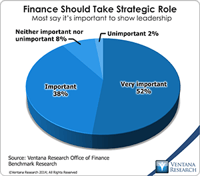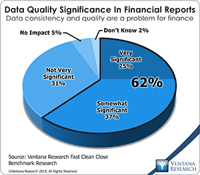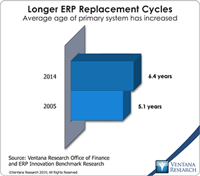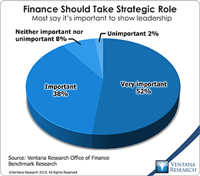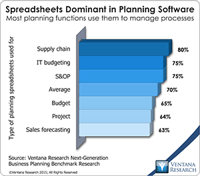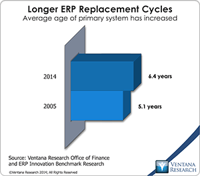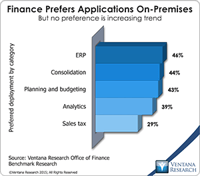Senior finance executives and finance organizations that want to improve their performance must recognize the value of technology as a key tool for doing high-quality work. Consider how poorly your organization would perform if it had to operate using 25-year-old software and hardware. Having the latest technology isn’t always necessary, but it’s important for executives to understand that technology shapes a finance organization’s ability to improve its overall effectiveness.
Read More
Topics:
Big Data,
Data Science,
Mobile,
Human Capital Management,
Mobile Technology,
Office of Finance,
Continuous Planning,
Analytics,
Business Intelligence,
Cloud Computing,
Collaboration,
Financial Performance Management,
Price and Revenue Management,
Inventory Optimization,
Operations & Supply Chain,
Enterprise Resource Planning,
Sales and Operations Planning,
Machine Learning and Cognitive Computing,
ERP and Continuous Accounting
Like many other industry observers I’ve heard overblown claims for information technology for decades. However, I’ve also observed that – eventually – reality catches up with vision. Finance and accounting departments are particularly resistant to change, yet because almost no corporations use adding machines or typewriters any more, it’s clear that transformative change can happen. Nonetheless, because users of business computing systems are inundated with “it’s better than ever” promotions by...
Read More
Topics:
Social Media,
Mobile Technology,
Office of Finance,
Operational Performance Management (OPM),
Human Capital,
Business Analytics,
Business Collaboration,
Business Intelligence,
Cloud Computing,
Business Performance Management (BPM),
Customer Performance Management (CPM),
Financial Performance Management (FPM),
Supply Chain Performance Management (SCPM)
Workiva offers Wdesk, a cloud-based productivity application for handling composite documents. I use the term “composite document” to refer to those in which text is created and edited collaboratively by multiple contributors and which incorporates tabular and numerical data from multiple sources in a controlled process. Composite documents often have formats defined by law, regulation or contract and must be created at periodic intervals. To comply with the requirement by the United States...
Read More
Topics:
Mobile Technology,
Business Collaboration,
Cloud Computing,
Governance, Risk & Compliance (GRC),
Uncategorized,
Business Performance Management (BPM),
Composite Software,
Financial Performance Management (FPM)
Infor recently held its annual Innovation Summit at its New York City headquarters. The company has shown leadership and creativity in business applications on two fronts: focusing its development efforts on enhancing the user experience and collaboration and building an application architecture that will deliver a rich set of functionality for ERP, financial management, CRM and HRMS and business analytics in a multitenant cloud environment. All of these advances were necessary to remake a...
Read More
Topics:
Mobile Technology,
Operational Performance Management (OPM),
accounting, analytics, ERP, EAM, CRM, HCM, innovat,
Human Capital,
Business Analytics,
Cloud Computing,
Uncategorized,
Business Performance Management (BPM),
Customer Performance Management (CPM),
Financial Performance Management (FPM),
Sales Performance Management (SPM),
Supply Chain Performance Management (SCPM)
The imperative to transform the finance department to function in a more strategic, forward-looking and action-oriented fashion has been a consistent theme of practitioners, consultants and business journalists for two decades. In all that time, however, most finance and accounting departments have not changed much. In our benchmark research on the Office of Finance, nine out of 10 participants said that it’s important or very important for finance departments totake a strategic role in running...
Read More
Topics:
Big Data,
Planning,
Predictive Analytics,
Social Media,
Governance,
GRC,
Mobile Technology,
Office of Finance,
Budgeting,
close,
Continuous Accounting,
Continuous Planning,
end-to-end,
Human Capital,
Tax,
Analytics,
Business Analytics,
Business Collaboration,
CIO,
Cloud Computing,
In-memory,
Uncategorized,
Business Performance Management (BPM),
CFO,
CPQ,
Financial Performance Management (FPM),
Risk,
CEO,
Financial Performance Management,
FPM
Supply and demand chain planning and execution have grown in importance over the past decade as companies have recognized that software can meaningfully enhance their competitiveness and improve their financial performance. Sales and operations planning (S&OP) is an integrated business management process first developed in the 1980s aimed at achieving better alignment and synchronization between the supply chain, production and sales functions. A properly implemented S&OP process routinely...
Read More
Topics:
Planning,
SaaS,
Sales,
Forecast,
Mobile Technology,
Operational Performance Management (OPM),
Human Capital,
Supply Chain Planning,
Analytics,
Business Analytics,
Business Collaboration,
Cloud Computing,
Business Performance Management (BPM),
Financial Performance Management (FPM),
Sales Performance Management (SPM),
Sales Planning,
Supply Chain,
Supply Chain Performance Management (SCPM),
Demand Chain,
Integrated Business Planning,
SCM Demand Planning,
S&OP
The enterprise resource planning (ERP) system is a pillar of nearly every company’s record-keeping and management of business processes. It is essential to the smooth functioning of the accounting and finance functions. In manufacturing and distribution, ERP also can help plan and manage inventory and logistics. Some companies use it to handle human resources functions such as tracking employees, payroll and related costs. Yet despite their ubiquity, ERP systems have evolved little since their...
Read More
Topics:
Big Data,
Microsoft,
SAP,
Social Media,
ERP,
FP&A,
Mobile Technology,
NetSuite,
Office of Finance,
Operational Performance Management (OPM),
Reporting,
close,
closing,
Controller,
dashboard,
Human Capital,
Reconciliation,
Analytics,
Business Intelligence,
Cloud Computing,
Collaboration,
IBM,
Oracle,
Uncategorized,
Business Performance Management (BPM),
CFO,
Data,
finance,
Financial Performance Management (FPM),
Supply Chain Performance Management (SCPM),
Financial Performance Management,
FPM,
Intacct
Whatever Oracle’s cloud strategy had been the past, this year’s OpenWorld conference and trade show made it clear that the company is now all in. In his keynote address, co-CEO Mark Hurd presented predictions for the world of information technology in 2025, when the cloud will be central to companies’ IT environments. While his forecast that two (unnamed) companies will account for 80 percent of the cloud software market 10 years from now is highly improbable, it’s likely that there will be...
Read More
Topics:
Microsoft,
Predictive Analytics,
SAP,
ERP,
FP&A,
Mobile Technology,
NetSuite,
Office of Finance,
Operational Performance Management (OPM),
Reporting,
close,
closing,
Controller,
dashboard,
Human Capital,
Tax,
Analytics,
Business Collaboration,
Business Intelligence,
Cloud Computing,
Collaboration,
IBM,
Oracle,
Business Performance Management (BPM),
CFO,
Customer Performance Management (CPM),
Data,
finance,
Financial Performance Management (FPM),
Sales Performance Management (SPM),
Supply Chain Performance Management (SCPM),
Financial Performance Management,
FPM,
Intacct,
Spreadsheets



